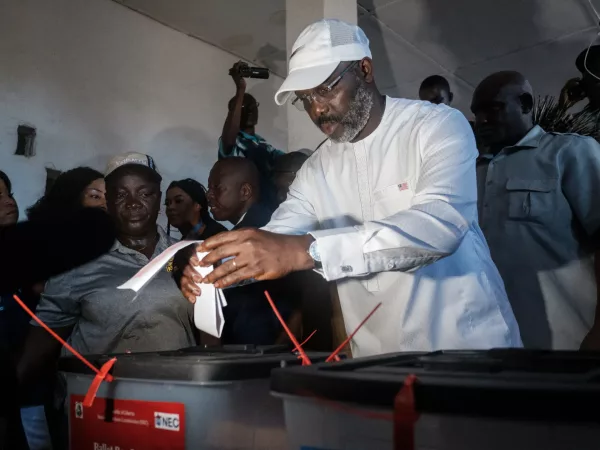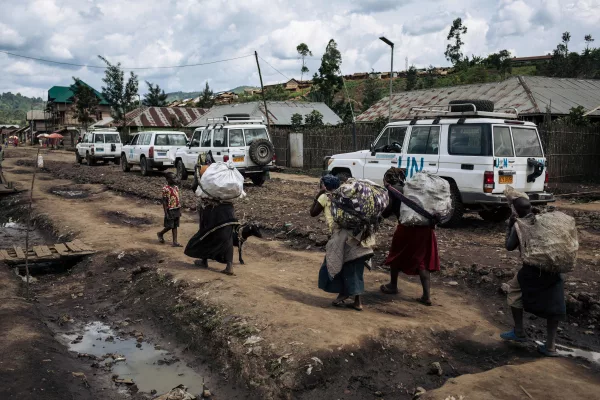Throughout a year in which many democracies have struggled to stay as such, and democratic backsliding seems to be on the rise, recent elections in Liberia were predicted by many to become another example of the trend. The country is surrounded by multiple nations that have recently been stricken by military coups, such as Burkina Faso. Libera was predicted to follow in these footsteps as governmental corruption put the country’s integrity at risk. Many speculated that the current president, George Weah, would attempt to hang on to power through illegal means were he to lose the elections.
However, to the positive surprise of many, Weah conceded peacefully before the election commission even announced a winner. Weah, arguably most famous for his career as a football player and champion of the Ballon d’Or, first became President of Liberia in 2018, running on a platform of anti-corruption measures and ensuring justice for victims of the country’s civil war. However, his time in office has been marred by accusations that he has not followed through with his campaign promises. Despite Weah’s promises to root out governmental corruption, during his presidency Liberia has fallen in world rankings to become one of the world’s most corrupt economies. He has also faced criticism for failing to provide justice for those affected by war crimes during the Liberian civil wars, a key issue for many given the still-raw emotions from the civil wars in Liberia.

Only two decades ago, Liberia emerged from a long period of civil war. For over two decades, from the 1980s to the early 2000s, it struggled with two subsequent civil wars that ravaged the country. The first civil war had its roots in the coup by Samuel Doe, who thereafter built a military regime, suppressed the opposition, held elections widely condemned as fraudulent, and persecuted certain ethnic minorities. His brutal reign led to an invasion by rebels from the neighboring Cote d’Ivoire, who quickly defeated Doe and his forces, but also committed atrocities against ethnic groups that supported Doe’s dictatorship. Eventually, after a military intervention by the Economic Community of West African States, (ECOWAS), a peace deal was reached and elections were overseen by a UN mission through which Charles Taylor, an anti-Doe rebel leader, won, putting an end to the conflict.
Unfortunately, peace did not last as only two years later, new rebel groups emerged, prompted by Taylor’s crackdown on dissent and refusal to cooperate with other ethnic groups. Additionally, Taylor’s support of paramilitary organizations all throughout West Africa lost support for his government from major Western backers like the UK and USA, in addition to drawing sanctions from the UN. Invading from Guinea, rebel groups rapidly advanced through the country, soon arriving at the outskirts of Monrovia, the capital of Liberia. It took over 15,000 UN troops to stem the conflict but eventually, fair and free elections were held again in 2005, in which Ellen Johnson Sirleaf became Africa’s first female president. She brought stability to the country, but Liberia was devastated, with over 250,000 people killed, its infrastructure in ruins, and relations with other nations full of tension. Crucial to the rebuilding of the nation was not only Sirleaf’s government but also the UN peacekeeper deployment, which has been called one of its most successful missions.

Weah, who was inaugurated president in the first peaceful handover of power since the civil war, was seen by many as a new hope for the country. While, evidently, voters were less than impressed with his term in office, what remains impressive to many is his prompt, peaceful, and orderly transition to power, especially in a region that has seen eight coups in neighboring countries over the last three years. Liberia’s elections have served as a beacon of hope for a region that desperately needs it, where even elections not resulting in coups have seen accusations of irregularities and fraud. Nevertheless, the incoming president, Joseph Boakai, together with Weah, have gone against the tide in their collaboration, which has ensured continued peace in Liberia.
Boakai, a former vice president under Ellen Johnson Sirleaf, ran on a platform of unity, rule of law, and judiciary reform. In addition to his time as vice president, he served as minister of agriculture and previously ran, and lost, for president, against Weah in 2017. Boakai has promised to combat the rising inflation in food and energy prices which has squeezed the wallets of many Liberians, while reviewing mining contracts he has described as exploitative. While, it remains to be seen if he will follow through with his promises, a majority of Liberians seem to believe that he will.
Cover Image Caption: President-elect Joseph Boakai waves to a crowd at his final campaign rally before the election. Image Source: https://s.france24.com/media/display/299f9068-85dc-11ee-bf39-005056bfb2b6/w:980/p:16×9/2023-11-17T194030Z_247677982_RC2SN3A2BYUE_RTRMADP_3_LIBERIA-ELECTION.JPG.







